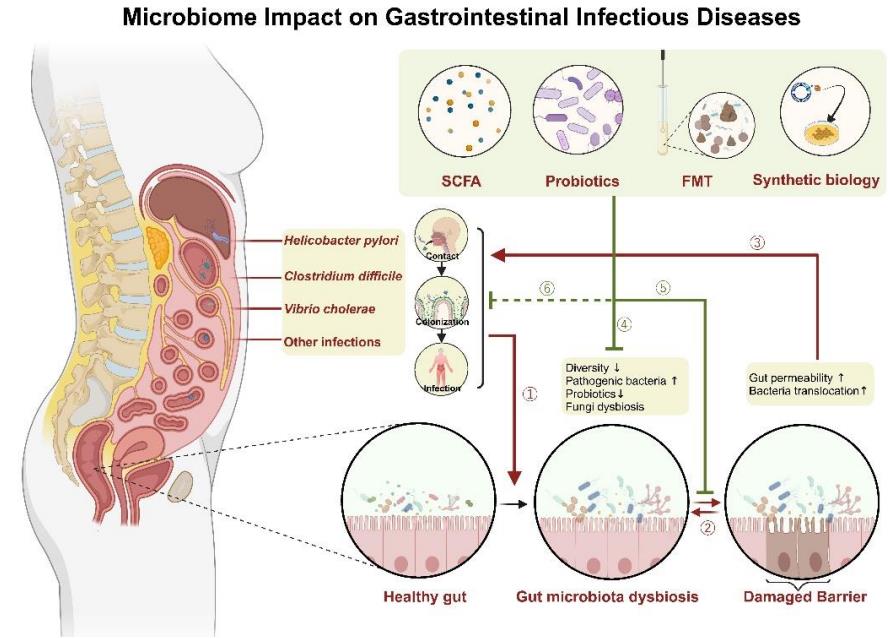With wealthy experience in antibody development, Creative Biolabs is proud to provide our clients with a panel of biomarker-specific in vitro diagnostic (IVD) antibody (pairs) for the detection of gastrointestinal infections.
Gastrointestinal infectious (GI) are infections caused by bacteria, virus, or parasite whose predominant chief complaint is diarrhea. The gastrointestinal infectious often leads to gastroenteritis, an inflammation of gastrointestinal tract involving both the stomach and small intestine. In general, gastrointestinal infectious may result in abdominal cramping followed by diarrhea. Patients may also experience symptoms like fever, loss of appetite, nausea, vomiting, dehydration, weight loss or mucus or blood in stools. It is responsible for substantial morbidity, mortality and socioeconomic penalties all over the world and contributes significantly to the overall burden of human disease.
 Fig.1 The interaction between gut microbiota and gastrointestinal infections.1
Fig.1 The interaction between gut microbiota and gastrointestinal infections.1
Epidemiology of Gastrointestinal Infectious
Which pathogens or factors are responsible for gastrointestinal infectious or diarrhea depends on the geographic area a person lives and its level of sanitation, hygiene standards, and economic development. Owing to the poor sanitation and undeveloped economy in poor countries, the infants and young children keep the greatest burden of gastrointestinal infection diseases although immunocompromised patients and elder people bear the great risk of severe and complicated disease. While in developed countries, outbreaks of diarrhea are often caused by food poisoning which happens when people eat food contaminated with toxins that made by bacteria. Mostly the gastrointestinal infections are self-limited which can resolve within a few days. However, it may become potentially serious when infections occur in specific populations including newborns/infants, immunocompromised patients, and elderly populations, or even worse the infections may quickly pass through by groups like a household, a college dorm or other place where lots of people live together. As a result, rapid diagnosis, appropriate treatment, and control measures are significantly important.
Diagnosis and Treatment of Gastrointestinal Infectious
Laboratory tests by culture or antigen detection from stool specimens are used to confirm the diagnosis when clinical manifestations point to a possible gastrointestinal infection. Antibiotic susceptibility testing also can be used to determine microbial resistance to antibiotic therapy in certain cases. Some rapid diagnosis in hospital settings contributes a lot in the implementing infection control measures. Most gastrointestinal infectious do not need treatment as it will go away in a few days. But some measures may be taken to release the clinical symptoms like fever, vomiting, or dehydrated. In addition, preventive measures by proper hand-washing, isolation from contaminated agents or avoid prescribing antibiotics unnecessarily remains the best way to combat gastrointestinal infectious.
Our IVD antibody services target the following pathogens of gastrointestinal infections, including but not limited to:
If you are interested in our products or services, please feel free to contact us for more information and a detailed quote.
Reference
- Han, Ziying, et al. "Therapeutic Approach Targeting Gut Microbiome in Gastrointestinal Infectious Diseases." International Journal of Molecular Sciences 24.21 (2023): 15654. Distributed under Open Access license CC BY 4.0, without modification.
For Research Use Only.